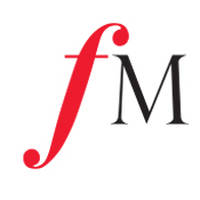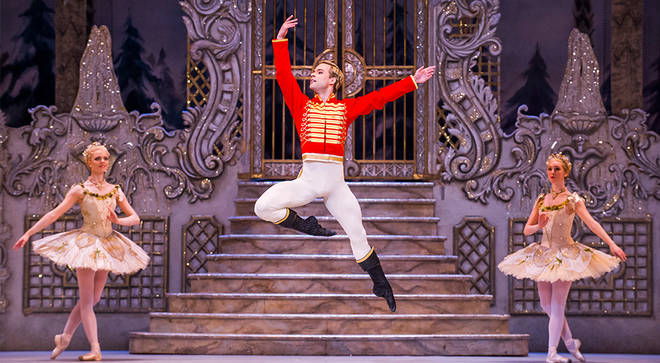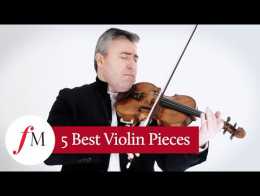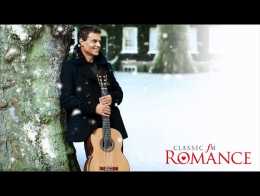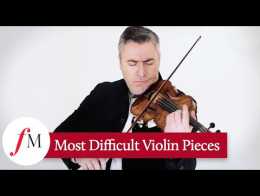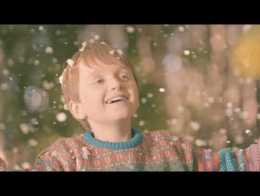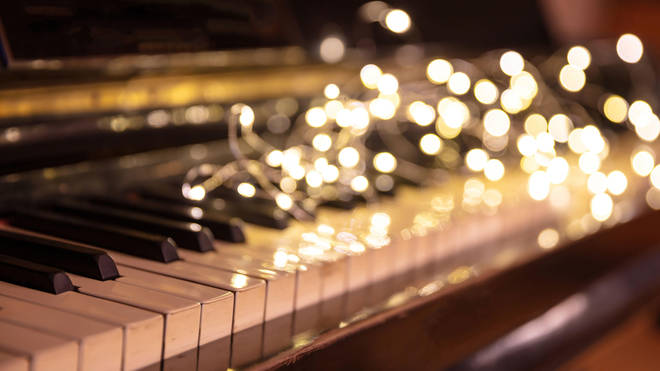
Christmas is upon us, which means it’s time to rediscover all those favourite festive pieces of music.
Find out how classical music does Christmas, from traditional carols to obscure gems you may not yet have heard...
The Nutcracker – Pyotr Ilyich Tchaikovsky
The Nutcracker is something of a Christmas tradition. The festive tale of a toy soldier that comes to life has endured over the years and been subject to some radical retellings. But it’s ’s music at the centre that makes the beloved ballet that little bit more special.
Read more:
The Nutcracker at the Royal Opera House. Picture: Royal Ballet/Tristram Kenton Troika – Sergei Prokofiev
Taken from his Lieutenant Kijé, ’s festive sleigh-ride of a piece is not only a mainstay in Christmas concerts around the world, but on hit radio stations too. English musician, Greg Lake, samples the Russian composer’s melody in his 1975 Christmas song, ‘I Believe in Father Christmas’.
Read more:
Carol Symphony – Victor Hely-Hutchinson
Written in 1927, Victor Hely-Hutchinson’s festive shindig of a piece takes the listener on a tour of some of the best-loved Christmas carols including ‘’, ‘’ and ‘The First Noël’.
L’Enfance du Christ – Hector Berlioz
Berlioz wrote the oratorio L’Enfance du Christ from 1854. It’s a huge work, which took four years to compose, and depicts not just the childhood of Christ but also Herod’s mass murder of infants in Judea, which led to the fleeing of Mary, Joseph and Jesus. The best-known section, ‘The Shepherds’ Farewell’, is a glorious blend of warm woodwind sounds, sublime choral harmonies and sensitive orchestral accompaniment.
Christmas Greeting – Edward Elgar
While not one of Elgar’s best-known works, this delicate little Christmas song showcases his pastoral roots. Descriptions of the English countryside and calls of ‘Noël!’ make this an underrated festive gem.
Christmas Overture – Samuel Coleridge-Taylor
Coleridge-Taylor brings together a conglomeration of Christmas melodies and carols in his Christmas Overture. But this work is so much more than just an arrangement of well-known classics for orchestra, as the composer’s cleverly placed integrations show.
It is thought the piece was composed by Coleridge-Taylor for the children’s play, The Forest of Wild Thyme. The work was published posthumously in 1925, 13 years after the composer’s death, age just 37.
Christmas Prelude for Chamber Orchestra – Vítězslava Kaprálová
Czech composer, Vítězslava Kaprálová, wrote the orchestral miniature, Christmas Prelude for Chamber Orchestra, in 1939 for a Christmas program on the Paris PTT Radio. The unusual timbre of the work sets this short orchestral excursion apart from other festive favourites in this list, with the role of the harp beside the chamber orchestra and piano bringing a new colour to the work.
Song for Snow – Florence Price
Written in 1930, this beautiful work by Florence Price for chorus and piano opens with the evocative lyric, ‘The earth is lighter than the sky’. The song’s text comes from a poem of the same name by American author, Elizabeth Coatsworth.
Price’s vocal lines emulate falling snowflakes with an overarching descending melody, and a delicate piano accompaniment. Soft staccato homophony later evokes an icy landscape, before returning to the sweet, laid-back melody.
Sleigh Ride – Leopold Mozart
Leopold Mozart’s Sleigh Ride takes the listener on a quaint though brief trot through a snowy forest on the back of a horse-drawn sleigh. Complete with an almost continuous drone of sleigh bells, ‘Schlittenfahrt’ was written by Leopold shortly before the birth of his son, Wolfgang Amadeus Mozart. Alongside the festive percussion instrument, the score also calls for a rattle, a whip, and triangle among the orchestra.
The younger Mozart would quote from his father’s festive work in his own ‘3 German Dances’ a few decades later.
A Ceremony of Carols – Benjamin Britten
This Christmas choral staple is one of Britten’s best-known works. Scored for three-part treble chorus, solo voices and harp, the piece is based on medieval carols.
The work was originally scored for and first performed by the women of the Fleet Street Choir, but Britten quickly decided that the sound of boys’ treble voices were better at reflecting the child-like innocence he wanted to achieve through his setting.
Sleigh Ride – Leroy Anderson
The second Sleigh Ride on our list was written two centuries after Leopold Mozart’s work, but contains just as many sleigh bell passages. Leroy Anderson’s Sleigh Ride, written in 1948, is a light orchestral standard, and was famously written during a heatwave in July.
Like the Mozart work, Anderson employs another unusual instrument in his orchestration – this time, the use of woodblocks to create a horse-like ‘clip-clop’. Towards the end of the piece, a trumpeter is also instructed to make the sound of a horse whinnying using the brass instrument.
Read more:
Christmas Concerto – Arcangelo Corelli
The pastoral strains of ’s Christmas Concerto have been a festive mainstay since the work’s publication in 1714. Published as Concerto grosso in G minor, Op. 6, No. 8, the work was published posthumously and gained its Christmas name due to an inscription on the title page reading, ‘Fatto per la notte di Natale (made for the night of Christmas)’.
Corelli uses folk-like tunes, and sounds evoking bagpipes to conjure images of the biblical shepherds attending the manger at the birth of Jesus.
Christmas Oratorio – Johann Sebastian Bach
Written in 1734, J.S. Bach’s popular Christmas work is one of the choral masterpieces of the Baroque era. The Christmas Oratorio was written in six parts, for performance on one of the major feast days during the period between Christmas Day and Epiphany.
Despite this, Bach clearly envisaged the work being heard as one united whole, and the full oratorio can be heard in churches across the world over the festive season.
Messiah – George Frideric Handel
This English-language oratorio by Handel may have been composed for and first performed during Eastertide, but the choral work is a mainstay in Christmas concerts around the world.
Handel confidently announces the birth of Christ with a radiant section of his Messiah that quotes St Luke’s gospel, ‘For Unto Us A Child Is Born’, and the famed ‘Hallelujah’ Chorus, despite being written to proclaim Christ’s Resurrection, is often associated with the Christmas season.
'Silent monks' perform Handel's Hallelujah Chorus in hilarious high school concertCredit: South Kitsap High SchoolOratorio de Noël – Camille Saint-Saëns
Saint-Saëns wrote this oratorio in just one fortnight, submitting the work just 10 days before its premiere performance in 1858. Scored for soloists, chorus, organ, strings and harp, the composer was highly influenced by music from traditional Christmas church liturgies.
The cantata-like work is divided into 10 movements; first a prelude, followed by nine vocal pieces.
Christmas Eve: Orchestral Suite – Nikolai Rimsky-Korsakov
This sweeping orchestral suite was inspired by Rimsky-Korsakov’s four-act opera, Christmas Eve, written between 1894-95. In turn, his Christmas opera is based on an 1832 story by Russian Novelist, Nikolai Gogol, of the same name.
The magical story takes place in the snowy setting of Dikanka, Ukraine, and characters include the devil, witches, wizards, and spirits of both good and evil nature.
Stella Natalis – Karl Jenkins
Written in 2009, Welsh composer Sir Karl Jenkins’ 12-movement work explores the various themes of Christmastide. Stella Natalis, which translates to ‘star of birth’ or ‘star of origin’, draws inspiration from Bible Psalms, but also Zulu texts, and Hindu gods.
Winter – Antonio Vivaldi
While not strictly a Christmas work, Vivaldi’s fourth season, Winter, is a masterclass in depicting scenery through music. The Italian composer’s writing for violin and orchestra evokes visions of icy surroundings and bitter winds, particularly in the fast and frenzied high-pitched plucking from the strings.
Vivaldi's 'Winter' from the Arctic Philharmonic Chamber OrchestraHenning Kraggerud and The Arctic Philharmonic Chamber Orchestra.Christmas Waltz – Tchaikovsky
Like Vivaldi, Tchaikovsky also wrote a work dedicated to the Earth’s seasons. However, unlike Vivaldi’s four, Tchaikovsky wrote twelve movements, one for each of the months of the year. His twelfth movement was his Christmas Waltz, which is often performed on its own.
This dainty work for solo piano has metamorphosed into various orchestral arrangements since its publication, like the one below, and can be heard in concert halls around the world at Christmas time.
Christmas Tree Suite – Franz Liszt
Liszt’s Christmas Tree Suite (Weihnachtsbaum) is made up of 12 pieces for solo piano and is dedicated to his first grandchild, Daniela von Bülow. The suite includes pieces called ‘O Holy Night’, ‘Adeste Fideles’, and ‘Evening Bells’ (Abendglocken).
The work received its premiere on Christmas Day 1881 in Daniela’s hotel room in Rome, where she was staying with her grandfather. Perhaps a Christmas gift, it is regardless an appropriate date for a first performance of this ‘Weihnachts’ work.
Related Videos
